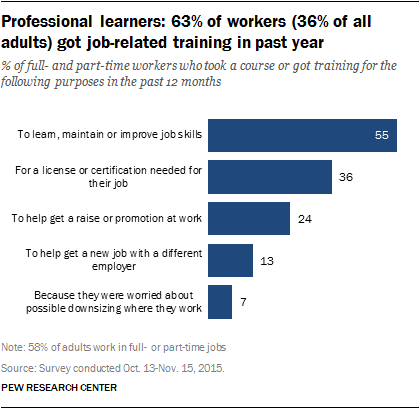
To understand learning for people’s jobs or careers, the survey employed a strategy similar to that for personal learning by presenting employed adults a list of reasons they might have sought out training or learning in the prior year. It turns out that in the past 12 months well over half of employed adults sought out training or course work to learn, improve or maintain job skills, while just over one-third had some training for a license or certification.
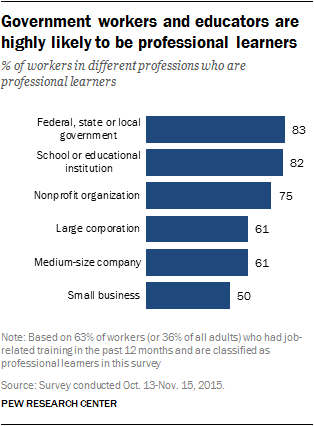
Altogether, 63% of employed adults took a course or got training for at least one of these five learning activities, which comes to 36% of all adults.
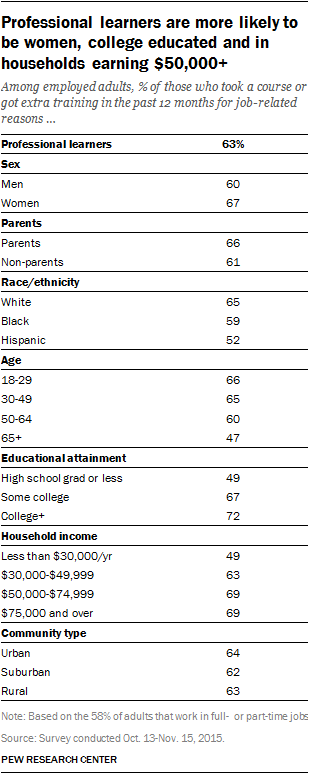
There is a good deal of variation in the incidence of professional learning that depends on the type of job people have. For instance, large majorities of those who work in government, education or for non-profit organizations did some professional learning in the past 12 months, compared with 63% of all employed adults.
Those who work in government or education make up a smaller share of the workforce (10% for each) than those identifying their workplace as a large (29%), medium (15%) or small business (27%). It is possible that the nature of jobs in government and education is more likely to lead people to work-place learning than jobs in large, medium or small businesses. It could also be that those fields have more requirements or opportunities for ongoing job training.
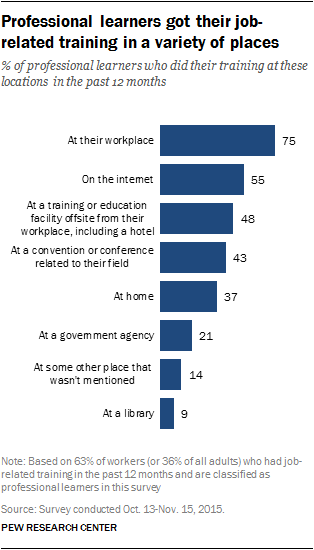
Moreover, there are some other noteworthy demographic differences among those who are professional learners. Those with college degrees or more, women, and those in the middle and upper income ranges are more likely to have done some professional learning in the past year. Hispanics and low-income Americans are much less likely to be professional learners, with African Americans somewhat below the norm.
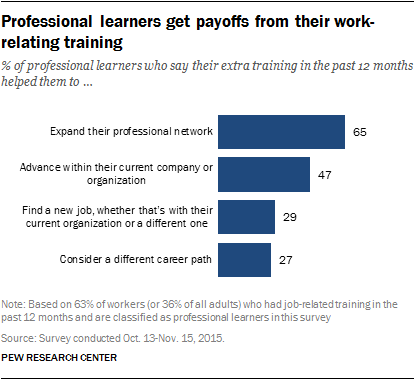
Adults’ perspectives on the nature of their jobs also shape whether they have engaged in professional learning in the past year. More than half (55%) of employed adults view their jobs as a career and another 17% see them as a stepping stone to a career. Of those two groups, 71% and 68% respectively have had workforce training or learning in the past year. For the one quarter (27%) of the employed population who see their job as something that lets them get by, 44% did some learning related to their job in the past year.
Where this learning takes place can encompass a number of places, but the workplace and the internet are the places people cite most often. Among those who have done learning in the past year related to their job or career, the nearby chart shows where their learning took place.
It is worth highlighting the role that physical spaces play in work-related training. At their workplace, dedicated offsite facilities, or conferences are significant for many respondents. Some 90% of professional learners cite one of these three places as the site where their learning takes place. The internet’s role is less prominent and, given the dominance of placed-based learning, is likely a supplement to learning that unfolds where people gather in the same place. The fact that just one-third (32%) of professional learners say that all or most of their learning takes place online reinforces the supplementary nature of the internet in this area.
As to impacts of professional learning, employed adults who do such learning are most likely to say it expands their professional network (65%) and nearly half (47%) say it has helped them expand in their current organization or company.




